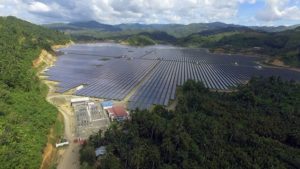Global Power prepares to venture into renewable energy

The 730-hectare solar panels of Toledo Power Corp. (TPC) operated by First Toledo Solar Energy Corp. , Toledo City.
CDN DRONE PHOTO
POWER producer Global Business Power Corporation will be exploring ways to develop renewable energy as it aims to become a sustainable energy provider.
Philip Dasalla, head of GBP commercial operations and strategy, noted that the company will be tapping diversified sources and innovative technologies to become one of the leading suppliers of sustainable energy solutions.
One of the reasons the company is considering the development renewable energy is the government’s renewable portfolio standards (RPS), Dasalla pointed out.
He says the company is “obligated to contract capacity from a renewable source.”
“Since, the company’s portfolio is basically coal and diesel, we would take the opportunity to participate in the RPS. And we also believe that to expand the company, renewable is the next thing,” Dasalla added.
The RPS is a market-based police that requires power distribution utilities, electric cooperative and retail electricity suppliers to source an agreed portion of their energy supply from eligible renewable energy facilities, according to the Department of Energy.
The guidelines on RPS that was released in December 2017 called for the start of Renewable Energy Market by December 2018.
The year 2019 will be the transition year when the mandated participants prepare for the mandatory RPS compliance that will start at 2020.
Failure to comply with the RPS may result in the administrative penalty ranging from a minimum penalty of P100,000 to P500,000 and possible revocation of the mandated participant’s license, franchise or authority.
Non-compliance could also mean criminal liability, under Section 36 and Section 35 of the Renewable Energy Act.
The eligible facilities under RPS include biomass, waste to energy technology, wind energy and solar energy, among others.
Dasalla maintained though that the company has to do due diligence on any renewable energy project to see if the cost per kilowatt-hour would be competitive.
One of the possible renewable energy the company is experimenting is the use of waste water from their coal-fired power plants to be able to generate energy, he said.
The company is currently experimenting on the use of wastewater, a byproduct of the coal-fired power plant, produce energy.
However, Dasalla said they were studying the use of wastewater that goes back to sea after being treated as a possible source of energy.
At present, the company operates several power plants. These include coal-fired power plant and a diesel plant.
Its subsidiaries include Cebu Energy Development Corporation (CEDC), Panay Energy Development Corporation (PEDC), Toledo Power Co. (TPC), Panay Power Corporation (PPC), GBH Power Resources, Inc. (GPRI) and Global Energy
Supply Corporation.
The CEDC, a consortium composed of Global Power, Aboitiz Power Corp., Vivant Energy Corporation and Formosa Heavy Industries Corporation (FHIC), the technical partner for engineering, procurement and construction.
The PEDC has a 167.4 MW clean coal-fired power plant, which is based in Barangay Ingore, La Paz, Iloilo City.
On the other hand, the TPC has two power plants – the 63-MW coal fired power plant in Sangi, Toledo City, and the 40-MW diesel-fired power plant in Carmen, Toledo City.
The GBP also has a 72-MW diesel-fired power plant operated by PPC and supplies power to Iloilo City as well as a 20-MW diesel plant, a 7.5-MW in Nabas and 5-MW in New Washington, Aklan.
These two plants provide the power requirement for the two municipalities as well as that of Boracay Island.
The company also has presence in Oriental Mindoro through the GPRI, which operates a 7.5-MW diesel-fired power plant in Pinamalayan.
Another subsidiary, the GESC, is a licensed retail electricity supplier and official retail energy arm of GBP.
It also owns 50 percent the Alsons Thermal Energy Corp. (ATEC), which owns 75 percent share in the 210-MW Sarangani Energy Corporation and 100 percent of San Ramon Power Inc., which has an ongoing 105-MW coal-fired power plant project in Zamboanga City.
Disclaimer: The comments uploaded on this site do not necessarily represent or reflect the views of management and owner of Cebudailynews. We reserve the right to exclude comments that we deem to be inconsistent with our editorial standards.




